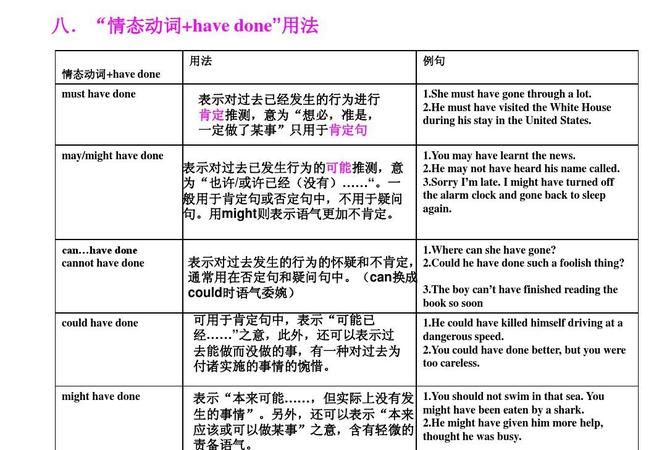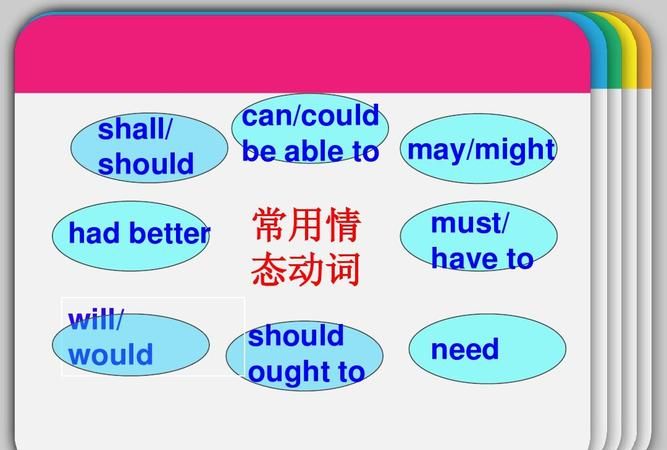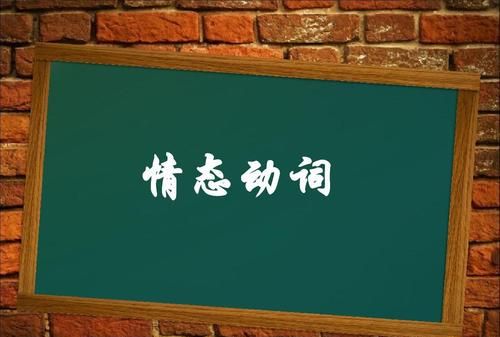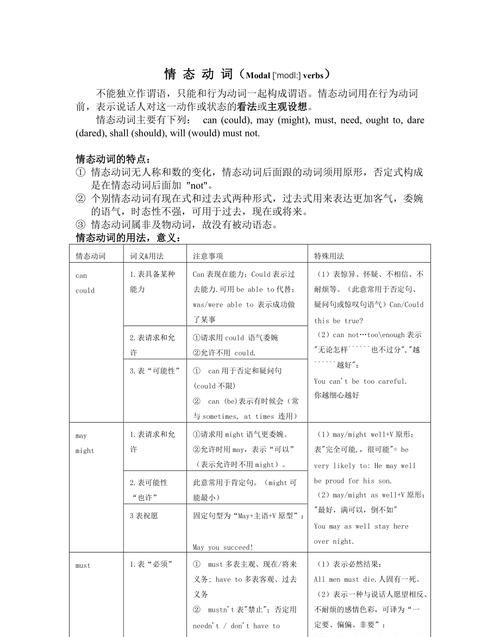本文目录
英文中情态动词有哪些
情态动词
老师叮咛:李辉老师说,“一切的道理比不过三个字,‘我愿意!’。”情态动词这个部分虽然并不在高考中占据很大的分值,但是掌握情态动词应当是一个愿意把英语学好的人所必需的。下面的内容就为大家讲解了表示推测的情态动词。本文经过了全网首席高考英语名师李辉老师团队高度认真的整理校对,无错、可信!可供全国各省高中生打印、背诵!
情态动词must, can / could, may / might均可表示推测,它们可以对过去、现在或将来的情况作出语气强弱不同的推测。在运用情态动词表示推测时,我们应该着重把握以下两点:
1. 把握推测语气的特点,选择恰当的情态动词。
(1) 表示肯定的推测时,各情态动词语气从弱到强依次为might→may→could→can→must;表示否定的推测时,can’t / couldn’t语气较强,意为“不可能”;may not / might not语气较弱,意为“可能不”。
【注意】must的否定形式mustn’t不表示否定推测,而是表示“不许可”或“不应该”。
(2) 情态动词表示推测时,在用法上有一些限制:
l must只用于肯定句中,意为“一定,准是”。Eg:
They have been working hard all day. They must be tired.
l can多用于否定句或疑问句中,could可用于各种句式。Eg:
Can the story be true?
Simon can’t be at home, for I saw him going shop-ping just now.
You mustn’t smoke when you are walking around in the wood. You could start a fire.
l may / might用于肯定句和否定句中。Eg:
It may or may not rain. I’m not sure.
Peter might come with us tonight, but he isn’t very sure yet.
2. 确定被推测时间,正确判断动词时态。
(1) 对现在或将来的情况进行推测时,用“情态动词+do”。Eg:
Mr. Reed looks pale. He may be ill.
If you don’t have a guide, you could lose your way.
(2) 对此时此刻正在进行的情况进行推测时,用“情态动词+be+动词-ing形式”。Eg:
At this moment, our teacher must be correcting our exam papers.
He could be doing his homework in his room now.
He may be waiting for you now.
(3) 对过去的情况进行推测时,用“情态动词+have+过去分词”。Eg:
The road is wet. It must have rained last night.
Mars couldn’t have watched TV yesterday for he knew they would have an exam.
He didn’t come to school yesterday. He might have been ill.
【拓展】在特定的语境中,“might/could+have+过去分词”不是对一件事情是否发生进行推测,而是表示本来可能发生但没有发生,或者本来可能完成却没有完成的动作,有时具有一定的感情色彩。
l might have done本可以做(却没有),有时表示很委婉的责备。Eg:
You might have phoned me, though you were busy then.
l could have done本可能做(却没有)。Eg:
He could have caught the early bus, but he was delayed by helping a stranger.
【即学即练】用must, can/could, may/might及括号内动词的正确形式填空。
1. —Where is David?
—He ________ (be) at school. Classes begin at 8.
2. I’m absolutely sure! They ________ (arrive) yesterday. I saw their tickets.
3. Are you joking? Mark ________ (go) to Paris. He doesn’t have enough money.
4. They ________ (live) in New York, but I’m not sure.
5. The concert ________ (be) wonderful last night. Fiore is a great conductor.
答案:
【即学即练】
1. must be
2. must have arrived
3. can’t have gone
4. may/might/could live
5. must have been

英语中情态动词是啥意思
情态动词是一种本身有一定的词义,但要与不带to的普通动词的不定式一起使用,给谓语动词增添情态色彩,表示说话人对有关行为或事物的态度和看法,认为其可能、应该或必要等。 情态动词后面加动词原形。
情态动词有四类: ①只做情态动词:must,can(could),may(might),ought
to ②可做情态动词又可做实义动词:need,dare ③可做情态动词又可做助动词:shall(should),will(would) ④具有情态动词特征:have(had)
to,used
to
情态情动词无人称和数的变化,
情态动词后面跟的动词需用原形,否定式构成是在情态动词后面加
"not"。
个别情态动词有现在式和过去式两种形式,
过去式用来表达更加客气,
委婉的语气,
时态性不强,
可用于过去,现在或将来。情态动词属非及物动词,故没有被动语态。

英语中考必考语法知识点归纳
情态动词有can (could), may (might), must, have to, shall (should, will (would), dare (dared), need (needed), ought to等。 情态动词无人称和数的变化;不能单独使用,必须与其后的动词原形构成谓语。
一、 can, could
1) 表示能力(体力、知识、技能)。
Can you lift this heavy box?(体力)
Mary can speak three languages.(知识)
Can you skate?(技能)
此时可用be able to代替。Can只有一般现在时和一般过去式;而be able to则有更多的时态。
I’ll not be able to come this afternoon.
当表示“经过努力才得以做成功某事”时应用be able to,不能用Can。如:
He was able to go to the party yesterday evening in spite of the heavy rain.
2) 表示请求和允许。
-----Can I go now?
----- Yes, you can. / No, you can’t.
此时可与may互换。在疑问句中还可用could,might代替,不是过去式,只是语气更委婉,不能用于肯定句和答语中。
---- Could I come to see you tomorrow?
---- Yes, you can. ( No, I’m afraid not. )
3) 表示客观可能性(客观原因形成的能力)。
They’ve changed the timetable, so we can go by bus instead.
This hall can hold 500 people at least.
4) 表示推测(惊讶、怀疑、不相信的态度),用于疑问句、否定句和感叹句中。
Can this be true?
This can’t be done by him.
How can this be true?
二、 may, might
1) 表示请求和允许。might比 may语气更委婉,而不是过去式。否定回答时可用can’t或mustn’t,表示“不可以,禁止”。
----Might/ May I smoke in this room?
---- No, you mustn’t.
---- May/Might I take this book out of the room?
---- Yes, you can. (No, you can’t / mustn’t. )
用May I...?征徇对方许可时比较正式和客气,而用Can I...?在口语中更常见。
2)用于祈使句,表示祝愿。
May you succeed!
3) 表示推测、可能性(不用于疑问句)。
might不是过去式,它所表示的可能性比may小。
1.He may /might be very busy now.
2.Your mother may /might not know the truth.
三、 must, have to
1) 表示必须、必要。
You must come in time.
在回答引出的问句时,如果是否定的,不能用mustn’t(禁止,不准),而用needn’t, don’t have to(不必).
---- Must we hand in our exercise books today?
---- Yes, you must.
---- No, you don’t have to / you needn’t.
2) must是说话人的主观看法, 而have to则强调客观需要。Must只有一般现在时, have to 有更多的时态形式。
1. he play isn’t interesting, I really must go now.
2. I had to work when I was your age.
3) 表示推测、可能性(只用于肯定的陈述句)
1. You’re Tom’s good friend, so you must know what he likes best.
2. Your mother must be waiting for you now.
四、 dare, need
1) dare作情态动词用时, 常用于疑问句、否定句和条件从句中, 过去式形式为dared。
1. How dare you say I’m unfair?
2. He daren’t speak English before such a crowd, dare he?
3. If we dared not go there that day, we couldn’t get the beautiful flowers.
2) need 作情态动词用时, 常用于疑问句、否定句。在肯定句中一般用must, have to, ought to, should代替。
1.You needn’t come so early.
2. ---- Need I finish the work today?
---- Yes, you must. / No, you needn’t.
3) dare和 need作实义动词用时, 有人称、时态和数的变化。在肯定句中,dare后面常接带to的不定式。在疑问句和否定句中,dare后面可接带to或不带to的不定式。而need后面只能接带to的不定式。
1. I dare to swim across this river.
2. He doesn’t dare (to) answer.
3. He needs to finish his homework today.
五、 shall, should
1) shall 用于第一人称,征求对方的意见。
What shall we do this evening?
2) shall 用于第二、三人称,表示说话人给对方的命令、警告、允诺或威胁。
1. You shall fail if you don’t work hard.(警告)
2. He shall have the book when I finish it.(允诺)
3. He shall be punished.(威胁)
六、 will, would
1) 表示请求、建议等,would更委婉。
Will / Would you pass me the ball, please?
2) 表示意志、愿望和决心。
1. I will never do that again.
2. They asked him if he would go abroad.
3) would表示过去反复发生的动作或某种倾向。would表示过去习惯时比used to正式,且没有“现已无此习惯”的含义。
1. During the vacation, he would visit me every other day.
2. The wound would not heal.
4) 表示估计和猜想。
It would be about ten o’clock when she left home.
七、 should, ought to
1) should, ought to表示“应该”,ought to表示义务或责任,比should语气重。
1. I should help her because she is in trouble.
2. You ought to take care of the baby.
2) 表示劝告、建议和命令。should, ought to可通用,但在疑问句中常用should。
1. You should / ought to go to class right away.
2. Should I open the window?
3) 表示推测
should , ought to (客观推测), must(主观推测)。
1.He must be home by now. (断定他已到家)
2.He ought to/should be home by now.(不太肯定)
3. This is where the oil must be.(直爽)
4. This is where the oil ought to/should be.(含蓄)
八、 情态动词+不定式完成式(have done)
1) can / could + have done在肯定句中表示“本来可以做而实际上能做某事”,是虚拟语气;在疑问句或否定句中表示对过去行为的怀疑或不肯定, 表示推测。
1. You could have done better, but you didn’t try your best. (虚拟语气)
2. He can’t have been to that town.(推测)
3. Can he have got the book?(推测)
2) may / might +不定式完成式(have done)
表示对过去行为的推测。不能用于疑问句中,没有虚拟语气的用法。Might所表示的可能性比may小。
1. He may not have finished the work .
2. If we had taken the other road, we might have arrived earlier.
3)must +不定式完成式(have done)
用于肯定句中,表示对过去行为的推测。意为“一定、想必”。其疑问、否定形式用can,can’t代替。参看1) can / could + have done表示推测。
1. You must have seen the film Titanic.
2. He must have been to Shanghai.
4)should +不定式完成式(have done)
用于肯定句中,表示对过去行为的推测。
He should have finished the work by now。
表示“本应该做而实际上没有做某事”,其否定式表示某种行为本不该发生却发生了。可以与ought to +不定式完成式(have done)互换。
1. You ought to / should have helped him. (but you didn’t.)
2. She shouldn’t have taken away my measuring tape, for I wanted to use it.
5) needn’t +不定式完成式(have done)
表示“本来不必做而实际上做了某事”。
You needn’t have watered the flowers, for it is going to rain.
6) will +不定式完成式(have done)
主要用于第二、三人称,表示对已完成的动作或事态的推测。
He will have arrived by now.

在英语中什么是元音字母
情态动词有:
can, could, may, might, ought to, have to, need, shall, should, will, would, dare
情态动词有can (could), may (might), must, have to, shall (should, will (would), dare (dared), need (needed), ought to等. 情态动词无人称和数的变化;不能单独使用,必须与其后的动词原形构成谓语
一、 can, could
1) 表示能力(体力、知识、技能).
Can you lift this heavy box?(体力)
Mary can speak three languages.(知识)
Can you skate?(技能)
此时可用be able to代替.Can只有一般现在时和一般过去式;而be able to则有更多的时态.
I’ll not be able to come this afternoon.
当表示“经过努力才得以做成功某事”时应用be able to,不能用Can.如:
He was able to go to the party yesterday evening in spite of the heavy rain.
2) 表示请求和允许.
---Can I go now?
--- Yes, you can. / No, you can’t.
此时可与may互换.在疑问句中还可用could,
might代替,不是过去式,只是语气更委婉,不能用于肯定句和答语中.
---- Could I come to see you tomorrow?
---- Yes, you can. ( No, I’m afraid not. )
3) 表示客观可能性(客观原因形成的能力).
They’ve changed the timetable, so we can go by bus instead.
This hall can hold 500 people at least.
4) 表示推测(惊讶、怀疑、不相信的态度),用于疑问句、否定句和感叹句中.
Can this be true?
This can’t be done by him.
How can this be true?
二、 may, might
1) 表示请求和允许.might比 may语气更委婉,而不是过去式.否定回答时可用can’t
或mustn’t,表示“不可以,禁止”.
----Might/ May I smoke in this room?
---- No, you mustn’t.
---- May/Might I take this book out of the room?
---- Yes, you can. (No, you can’t / mustn’t. )
用May I...?征徇对方许可时比较正式和客气,而用Can I...?在口语中更常见.

以上就是关于英语里面什么叫情态动词,英文中情态动词有哪些的全部内容,以及英语里面什么叫情态动词 的相关内容,希望能够帮到您。
